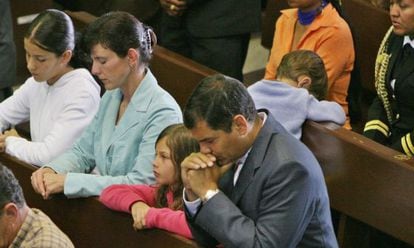Latin America’s religious left keeps progressive reforms at bay
Abortion, gay marriage and legalization of drugs are taboo topics for revolutionary governments

Praying the Hail Mary and genuflecting are common gestures by Latin American presidents in public, but they have becoming increasingly more characteristic among the leftist leaders who are trying to keep their nations from introducing social reforms that may run against traditional Christian values.
Issues such as abortion, homosexual marriage and the decriminalization of certain drugs tend to see the regions’ presidents teetering toward the conservative margin of society. In a region whose inhabitants are mostly Roman Catholic, controversial matters usually brings out the religious side in leftist leaders.
“Let them say what they want, but I will never legalize abortion,” Ecuadorian President Rafael Correa said earlier this month. He even threatened to step down from the presidency if lawmakers from his ruling Alianza País movement voted in favor of removing abortion’s status as a crime under a penal code reform.
“If you continue with your disloyalty and treason, […] I will present my resignation,” said Correa, who describes himself as a “humanist, Catholic and leftist.”
The leader of Ecuador’s Episcopal Conference, Antonio Arregui, immediately praised Correa for the “courage and nobility in the way he expressed himself.”
The abortion issue is sensitive matter in countries with leftist revolutionary governments. In Nicaragua, where the Sandinistas govern, and El Salvador, where the Farabundo Martí National Liberation Front (FMLN) is in office, abortion is severely punished and there are no plans on changing the law.
Earlier this year, Salvadoran President Mauricio Funes came under fire from international health groups and human rights organizations for not allowing doctors to perform an abortion on a young pregnant girl, Beatriz, who was facing death if she did not undergo the procedure. Physicians finally induced the child’s birth and the infant was delivered by cesarean.
In Nicaragua, President Daniel Ortega and first lady Rosario Murillo have come out publicly against legalizing abortion, even in emergency cases. After spending all of their lives as atheists, Ortega and his wife decided to exchange vows in a Catholic Church in 2005. He now describes himself as being “a Christian and Socialist.”
Nicaraguan Cardinal Miguel Obando y Bravo, once a fierce opponent of the Sandinistas, presided over their wedding and is now called upon to bless government-funded projects at public ceremonies.
God is also ever-present in speeches offered by Venezuelan President Nicolás Maduro, who has said he found religion after spending 18 years as a declared atheist because he had been against the Catholic Church’s policies. “Hugo Chávez made us all into true Christians,” Maduro said last April while he was on the campaign trail before his election that month. Legalizing abortion, drug consumption and homosexual marriage are not among the issues being pondered by Maduro’s government. They were also taboo subjects during the 14 years that Chávez governed before his death on March 5.
Many followers of the Chávez revolutionary movement consider homosexuality as degenerate behavior. Maduro even attacked the opposition’s leadership while he was foreign minister, calling them “stuck-up wimps,” “queers” and “fascists” during a speech on state-run television in April 2012.
Former Venezuelan guerrilla leader and ex-communist Teodoro Petkoff, who is now the editor of Tal Cual newspaper, believes that the leftist movement in Latin America is divided into two camps. “There is a leftist movement that is organized very well ideologically – the oldest kind of movement which with great courage tries to take a stance on positions that go against tradition,” Petkoff says in reference to the ideological bloc led by Uruguayan President José Mujica and which comprises large sectors in Brazil and Argentina.
The other camp harnesses traditional values across the rest of Latin America, he explains. “This is a type of neo-leftist movement, which has its origins with Chávez. It is only considered leftist by name and is completely traditionalist on these issues. At times, it is sincere in tackling moral and ethical issues that don’t separate politics from religion. At other times, it is a purely opportunistic stance to attract voters.”










































